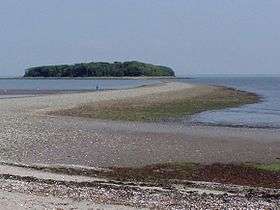Silver Sands State Park
| Silver Sands State Park | |
| Connecticut State Park | |
 Beach and tombolo to Charles Island at low tide | |
| Country | |
|---|---|
| State | |
| County | New Haven |
| City | Milford |
| Elevation | 7 ft (2 m) [1] |
| Coordinates | 41°12′09″N 73°04′15″W / 41.20250°N 73.07083°WCoordinates: 41°12′09″N 73°04′15″W / 41.20250°N 73.07083°W [1] |
| Area | 297 acres (120 ha) [2] |
| Established | 1960 |
| Management | Connecticut Department of Energy and Environmental Protection |
|
Location in Connecticut | |
| Website: Silver Sands State Park | |

Silver Sands State Park is a public recreation area located on Long Island Sound in the city of Milford, Connecticut.[3] The state park consists of 297 acres (120 ha) of beach, dunes, restored salt marsh, open areas and woods. It lies adjacent to the city-owned park, Walnut Beach, and includes the 14-acre (5.7 ha) bird sanctuary of Charles Island.[4] The park offers swimming, picnicking, trails, boardwalk, and opportunities for bird-watching.[3]
History
The park land was acquired by the state after Hurricane Diane destroyed 75 homes there in 1955. The area includes the tidal channels of the Fletcher's Creek and Nettleton Creek watershed and had been a local dumping site and landfill until 1977. Soil analyses have indicated the presence of heavy metal pollutants, probably due to the area's use as a dump.[5]
In 1997, a project to restore the coastal wetlands along Silver Sands was approved. The park was renovated according to plans begun in 1990 by architect Alfredo De Vido and completed in 2000.[6]
Features
During low tide, visitors can walk across the tombolo to Charles Island. The wooded interior of Charles Island is protected for heron and egret rookeries. It is one of the largest wading bird rookeries in the state.[4] The ruins of a Catholic retreat from the 1920s remain on the island. Popular belief says the island is the site of Captain Kidd's buried treasure.[3]
A boardwalk with railings extends from the parking lot to the beach (about 200 ft) and also runs along part of the beach. The land alongside the boardwalk had been used as a landfill. However, the salt water tidal marsh is being environmentally restored. Through the marsh, there are also remnants of the foundations of cottages that were destroyed by Diane. There is also an old dirt road that goes east-west through the park. Park trails form segments of the East Coast Greenway.
Many birds can be seen at the park. Least and common terns feed here. It is also a wintering area for raptors such as the rough-legged hawk, the snowy owl and the short-eared owl.[4]
References
- 1 2 "Silver Sands State Park". Geographic Names Information System. United States Geological Survey.
- ↑ "Appendix A: List of State Parks and Forests" (PDF). State Parks and Forests: Funding. Staff Findings and Recommendations. Connecticut General Assembly. January 23, 2014. p. A-3. Retrieved March 20, 2014.
- 1 2 3 "Silver Sands State Park". State Parks and Forests. Connecticut Department of Energy and Environmental Protection. July 18, 2016. Retrieved October 3, 2016.
- 1 2 3 "Silver Sands State Park". Audubon Connecticut. Retrieved June 25, 2013.
- ↑ Anthropogenic Trace Metals in Tidal Marsh Sediments, Silver Sands State Park, Milford, CT, Dias, S., Page, L., Fleming, T. H., and Coron, C. R., The Geological Society of America, Northeastern Section - 40th Annual Meeting (March 14–16, 2005) Saratoga Springs, New York.
- ↑ Alfredo De Vido, Stephen Dobney (2006). Alfredo DeVido: Selected and Current Works. The Master Architect Series III. Mulgrave, Victoria, Australia: Images Publishing Group. pp. 60–61. ISBN 978-1-875498-76-5.
External links
| Wikimedia Commons has media related to Silver Sands State Park. |
- Silver Sands State Park Connecticut Department of Energy and Environmental Protection
- Silver Sands State Park Map Connecticut Department of Energy and Environmental Protection